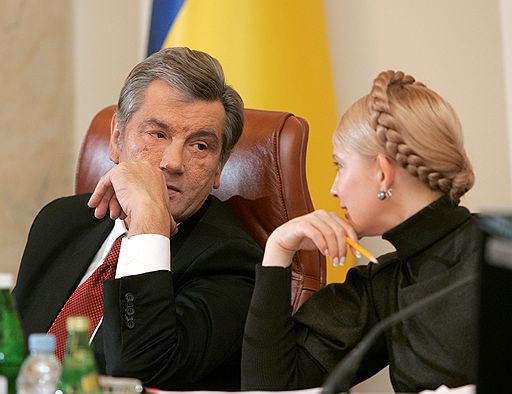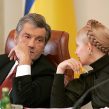
Can President Yushchenko Disrupt the Presidential Election?
Publication: Eurasia Daily Monitor Volume: 6 Issue: 174
By:

Ukraine’s second most popular presidential candidate, Prime Minister Yulia Tymoshenko, suspects that President Viktor Yushchenko -who is running for a second term- of conspiring to disrupt the presidential election scheduled for January 17, 2010. Yushchenko, to whom opinion polls give no more than 2-4 percent of popular support, has appealed to the constitutional court against several provisions in a new election law. Tymoshenko’s team suspects that he did so in order to find a pretext to cancel the election -or at least postpone it in an attempt to cling to power. While Yushchenko has not offered any comment to dispel suspicion, controversial statements by Yushchenko’s aides fuels such speculation.
Yushchenko vetoed a new version of the presidential election law, which was passed on July 24, but parliament overruled the decision on August 21. Commenting on the development, Ihor Popov, the Deputy Head of the Presidential Secretariat predicted that Yushchenko would appeal to the constitutional court against several provisions in the new law. He warned that the legitimacy of the election might be questioned if the court outlawed those provisions (Ukrainska Pravda, August 21).
Yushchenko appealed on September 15. His representative in the constitutional court Maryna Stavniychuk specified that he argued that the new law limits the rights of Ukrainians voting abroad, fails to ensure a transparent election process or offer mechanisms to improve voter lists, and does not provide for control of the process by courts (Ukrainska Pravda, September 15). Popov commented on the same day that if the constitutional court pronounced the provisions rejected by Yushchenko as unconstitutional, then the election could be disrupted. He urged parliament to urgently correct those provisions. If it did so, Popov said, the election would be held "in an organized and normal manner." He suggested that parliament’s failure to smoothly pass the 2010 state budget also threatened the election, because there would be no money to organize the process (Channel 5, September 15). Parliament may fail to pass the budget by the end of the year, due to a blockade of the session hall organized by the opposition Party of Regions (PRU) (EDM, September 16).
Popov’s statement prompted an angry reaction from Tymoshenko’s key ally, First Deputy Prime Minister Oleksandr Turchynov. He accused Yushchenko of trying to disrupt the election by both blocking the budget in parliament (Turchynov apparently suspects that Yushchenko backs parliament’s blockade by the PRU) and appealing against the new law. "This is his last chance to cling to power," explained Turchynov. He warned that if the court rejected the new law, all the election schedules and deadlines would be disrupted (Channel 5, September 17). Tymoshenko echoed Turchynov’s views the following day, warning about two possible scenarios to postpone the election, which she claimed were being prepared by Yushchenko’s team. According to the first scenario, the court would dump the new election law, consequently preventing an election. While the second scenario involved, "the economy being brought to collapse" through weakening the national currency and "a state of emergency should be imposed." Tymoshenko recalled that no election may be held during a state of emergency (Dnipropetrovsk Regional TV, September 18).
The Central Electoral Commission (TsVK), the constitutional court and Yushchenko’s team flatly dismissed the allegations by Turchynov and Tymoshenko. TsVK Deputy Head Andry Mahera said that parliament’s failure to pass next year’s budget would not affect the election process, since there are enough funds provided for the election in the 2009 budget to start the process (Interfax-Ukraine, September 18). Andry Stryzhak, the Chairman of the constitutional court said that even if the court pronounced the entire election law as unconstitutional, the election would be held according to the existing law. Stavniychuk, for her part, dismissed the possibility of imposing a state of emergency. She noted that the president would constitutionally require parliamentary approval, and that the parliament is dominated by the supporters of Tymoshenko and Yanukovych who would not agree to postpone the election (Kommersant-Ukraine, September 21). Yushchenko’s secretariat head Vira Ulyanchenko recalled that Yushchenko had not appealed against the entire law, but only several of its provisions, meaning that no court verdict could possibly disrupt the election (ICTV, September 20).
The PRU, whose leader Viktor Yanukovych is likely to be Tymoshenko’s main rival in the election, reacted calmly. Parliamentary Deputy Speaker Oleksandr Lavrynovych, who is a PRU senior member, suggested that Yushchenko’s appeal would not affect the election. He agreed with Ulyanchenko that Yushchenko appealed only against several provisions in the election law, so the court could not pronounce the entire law as unconstitutional (www.liga.net, September 21). Popov again suggested that parliament should urgently amend the law, in order to meet Yushchenko’s demands. In this case, he said, Yushchenko would recall his appeal from the court (Segodnya, September 21). Yanukovych’s unofficial spokeswoman Hanna Herman said that Yushchenko was not in a position to set conditions as his political influence is waning. "The presidential election will take place in any case," she predicted (Channel 5, September 21).




